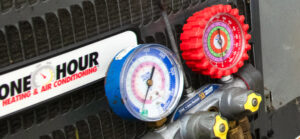Your HVAC system is designed to control airflow and temperature – not odors. HVAC systems will produce odors from time to time. While some odors are temporary and harmless, others can indicate a problem with your system and be a cause of concern. From rotten eggs to mold and mustiness, being able to identify problematic AC smells will allow you to pinpoint the problem and keep your home cool, safe, and smelling good like it should.
Rotten Eggs
If you walk into your home and smell rotten eggs, it’s a severe sign something is wrong with your HVAC system. Gas companies put additives in natural gas to make this foul smell noticeable and alert homeowners of leaks.
If you notice this smell, turn your system off, open the windows, go a safe distance from your home, and alert your gas utility company. Then, contact a heating and cooling specialist to schedule a checkup of your HVAC system as soon as possible.
Dirty Socks
Your home shouldn’t smell like a gym locker. However, the unpleasant odor of dirty socks is quite familiar to every HVAC professional. One of the more common AC smells is that it frequently occurs due to mildew and mold buildup on an AC’s evaporator coil when left off for an extended period.
The smell is most common in the springtime when systems transition from heating to cooling. Rather than welcoming these contaminants and their odors into your home, it’s best to call an HVAC technician to clean and sterilize the affected components.
Mold and Mustiness
Moldy, musty AC smells usually indicate a problem with the system’s condensation drain. When the drain is clogged, water can’t escape as it should, resulting in excess moisture and mold, and mildew growth.
Under the right conditions, this growth can extend to the condenser coil and even the ductwork running throughout your home. This means mold spores may be circulating through the air in your home right now. A qualified HVAC technician can solve this issue and keep it from reoccurring down the road.
Sewage
Depending on your HVAC system and how it was installed, it may be located close to a sewage line. The smell of sewage is distinct and caused by the production of gasses, like methane. Inhaling these gasses can be dangerous, so it’s best to contact a plumber immediately to fix the sewer line.
You should also call your local HVAC pro for advice on filters and managing odors in your home. In addition to bad AC smells, dirty or clogged filters can also cause your HVAC system to run inefficiently and lead to more significant air quality problems.
Burning Smoke
If you smell an odor of burning smoke in your home, try to detect where it is coming from. If the smell is coming from your HVAC system, turning the system off will eliminate any AC smells and help avoid fire and additional damage.
After turning the system off, call an HVAC technician. An HVAC expert can detect the source of the problem, which isn’t always easy, and fix it to keep your system running both safely and efficiently.
While not all AC smells are serious, some can indicate a significant problem and affect your quality of life. If any odors smell familiar, call your local HVAC expert and schedule a checkup right away.